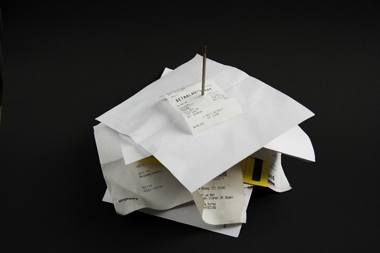

A shoebox full of receipts seem to be the norm for most of us, whether or not we manage our money online. Every time we make a purchase, we shove receipts in wallets, pockets or purses. We bring them home, sometimes sort them and drop them into a shoebox. From there, we ignore them until tax time — often even longer. But we don’t actually need most receipts. While some we may need to hold on to for taxes or records, the grand majority can be out of your house within a week.
Receipts tend to fall into two categories: those you need to keep at least long enough to double check them against your purchases when you get home and those you need to hold on to for a bit longer. The short-term keepers can be thrown away as soon as you’ve taken care of checking them — I tend to shred these sorts of receipts, but many don’t have any sort of information you really need to worry about.
There is a school of thought that you should keep a receipt until you get rid off whatever you purchased — for instance, you should hold on to a receipt from the grocery store until you finish off your gallon of milk. That’s because you can get reimbursements in many situations (like recalls) or may need to take the item back. It comes down to your personal choice just how long you want to keep receipts for things like groceries and gas, but generally, less than a month seems like a good choice. Otherwise, though, most personal expenses aren’t even short-term keepers. Your grocery receipt may not even need to make it out of the store’s door with you.
There are some receipts you may need to hold on to significantly longer than the month it takes for your card statement to arrive. Receipts can be used as proof of a whole list of different things, from tax deductions to warranties, so you’ll need to hold on to a few receipts. I know many people that scan these important receipts to make sure that they have them handy. The IRS does accept scanned receipts, but if you’re trying to work with a credit card company or insurer, you may need to hang on to the original.
Just how long you need to keep receipts for depends on just who might ask to see them. A good rule of thumb is that anything related to insurance or warranties can be thrown away once you get rid of the item in question — if you replace your stove, for instance, you’ll want to keep the new receipt, but you can throw away the receipt for the old appliance. For the IRS, how long you need to keep receipts can vary significantly: the very longest you might need a set of receipts is seven years.